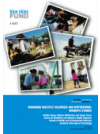There is a lack of research about MS in the New Zealand context and, in particular, about women who have MS and their experiences of becoming mothers. This research project explored the nature of pregnancy, birth and mothering young children for women with MS, and marked an important beginning to research about disabled women’s experiences of motherhood in New Zealand.
Nine women with MS, who had become mothers in the past five years, were interviewed individually about their experiences of pregnancy, birth and mothering children up to the age of five years. Interpretive analysis of the interviews identified seven themes:
- The variability of MS
- Thinking of oneself as a ‘normal’ mother – putting MS in the background
- Having a baby – a public private experience
- Medications – keeping the baby safe
- Support – anticipating and preventing relapses, and dealing with MS
- Conserving energy
- Being the ‘ideal’ mother
This study challenges apparent attitudes, beliefs and actions that may be ‘disabling’ to women with MS. It recommends actions that could be taken to encourage and educate for a nondisabling society for women and their families, as called for in the New Zealand Disability Strategy (Ministry of Health, 2001). The study has identified ways to address other aspects of the strategy by highlighting ways to support lifestyle choices, recreation and culture for disabled people; promote participation of disabled women in order to improve their quality of life; and value families, whānau and people providing ongoing support.
Purpose
The aim of this study was to gain a better understanding from the mothers’ perspectives of their experience of becoming mothers and to identify:
a. any areas of concern
b. the strategies that help families manage when the mother lives with MS.
Remarkably little information is available for women with MS on how to manage pregnancy, birth and motherhood taking into account their MS. With the rise in awareness of human rights and changing attitudes towards chronic illnesses, increasing numbers of women living with MS and other chronic conditions are choosing to become mothers.
Key Results
Given the preliminary nature of this research, implications were considered cautiously. We suggest three clear areas with relevance for enhancing the experience of motherhood for women with MS:
1. The importance of ‘listening’ to women’s stories prior to making assumptions about their attributions, aspirations and support needs in relation to motherhood. Clearly this has particular relevance for health and social professionals but is also relevant for members of the public, colleagues at work and family members.
2. The relative place of impairment in women’s lives is variable and likely to require ongoing consideration rather than one-off static assessment or action. Ongoing considerations should include the women’s life context as well as their pregnancy and impairment.
3. Knowledge and understanding in the area of motherhood for women with MS remains limited, particularly in New Zealand. It is vital that research focuses on how best to ensure appropriate health and disability policy is developed and quality health and social services/support is available for women with an impairment wishing to become mothers.

